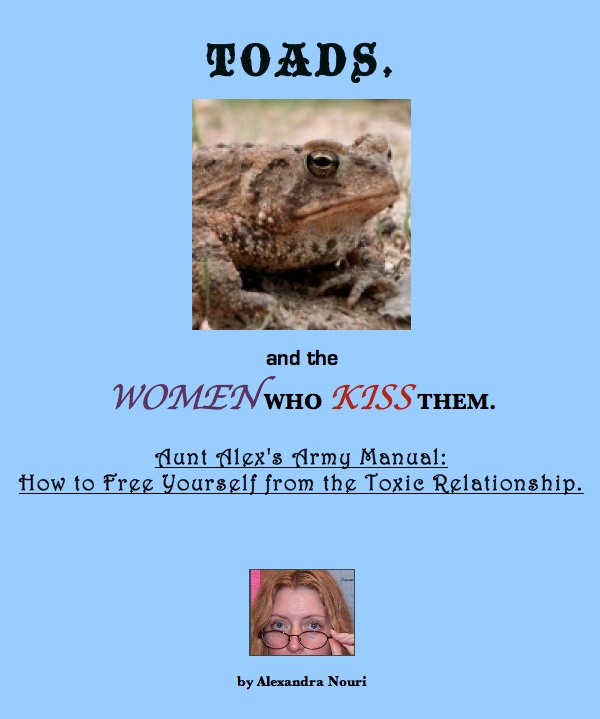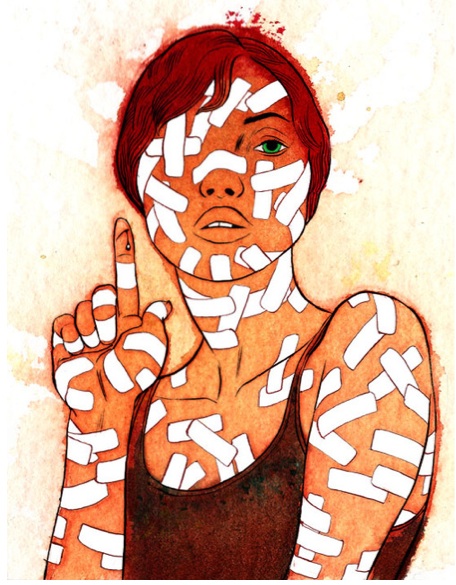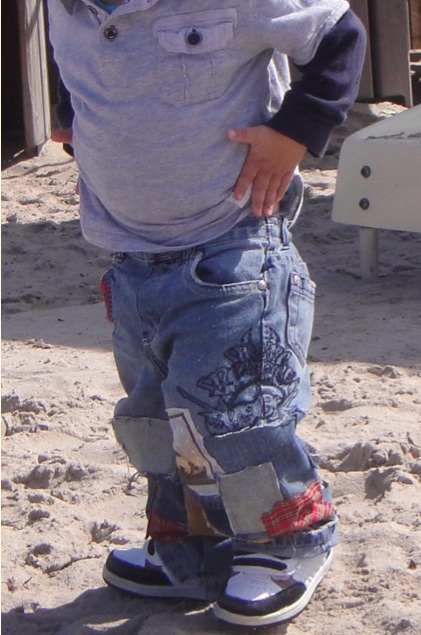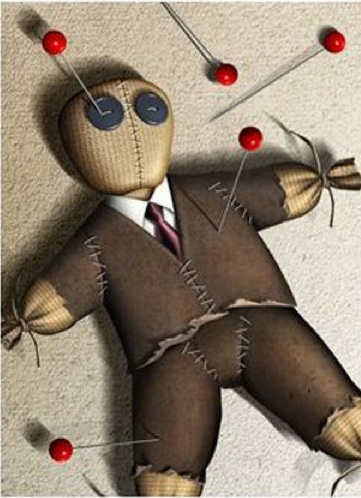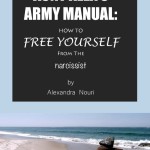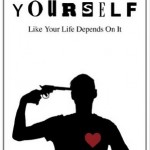As promised, Friends, here’s a sample from the Toads tome
( http://tinyurl.com/3j49a6a ).
It had some critical input from a social worker at Dartmouth Hitchcock Medical Center in Hanover, NH, named Sonya Mastersen, MSW, who edited for continuity and provided ample mental health info as well as helped the theme stay focused.
Tell me what you think, because we’re all Friends here and we want to make sure Aunt Alex didn’t wander into the Feeble Zone whilst listening to herself talk.
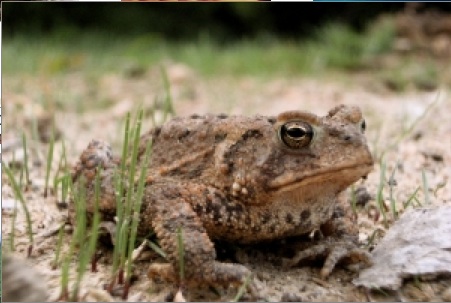
A FIELD GUIDE TO TOADS.
There are several different kinds of toads, in ALL shapes and sizes and varieties of scumbag, but here are some common traits.
### The only thing that fuels his motor is self-interest. The SELFISHNESS factor in toadcraft is off the charts. No matter how gifted of a manipulator he is, or how smooth his lies and deceptions are, his partner has noticed — often — that with this guy, it’s all about him. And it is. Without that normal, healthy ability to empathize, he can’t think of people, anybody, as even remotely important or even very interesting, except for what they can give him and do for him. Taking that a step further, it’s all about what they can do for him to make his life at any given moment easier or more entertaining for him, or to make him feel like a fabulous guy right that minute. He hurts others without guilt, he takes what he wants from others without remorse, he lies with revolting ease and has so little problem with it that he forgets his lies equally easily. He wants people to be appliances, dispensing what he needs when he needs it, and quietly out of the way when he doesn’t.
### Most toads like to be busy, often with COMPULSIVE little preoccupations. This helps keep him from thinking and feeling, things a normal person would actually enjoy doing. Toads don’t really like thinking or feeling because they’re unable to bond, and the consequential loneliness is desperately, bone-crushingly desolate and sad. His thoughts and feelings are steeped in self-loathing and anxiety. No wonder he avoids them.
The Truth is, he grows bored with a woman very quickly. Now, this is NOT a reflection on the woman. He grows bored with EVERYTHING.
A novel: Gripped, then bored.
A celebrity: Enthralled, then bored.
His old girlfriend: Fascinated, then bored.
A sports game: Jazzed, then bored.
Aliens landing in the backyard: Riveted, then bored.
He’s addicted to adrenaline because it makes him feel alive, and he’s bored more easily than a monkey in an empty cubicle. And that’s a hopeless combination.
### His MOOD SWINGS can give a person seasickness. His memory for loving gestures, kindnesses his partner or others show him, ways they try to bond with him, gifts they give to him, anything good, is nonexistent seconds after it happens. He can’t retain feelings and build on them because he doesn’t have that bonding “glue” that holds it all together. After he gets what he wants, the “feelings” dissipate, the time together is forgotten (completely, as though it had vanished), and he’s on to what he wants next. If he’s getting something, he’ll purr like a kitten right that moment. If he’s being “refused” (even if it’s because she has an emergency and can’t come over right then, or she’s sick, or she got in a car accident, or is justifiably mad because he’s been a jerk, or, really, anything), he’ll have a tantrum like a spoiled and not-quite-right-in-the-head kindergartner. He also gets moody very easily because he doesn’t have the mental health to handle even a little stress or anxiety, moderate life challenges, frustration, or disappointment. He’s perfectly OK with rampant mood swings. He doesn’t see them as a problem or even as at all unusual, because they reflect the tornado of contradictions, struggles, and chaos in his head. When a sane person feels peaceful, they like having peaceful surroundings. When a frog Prince feels energized and excited, he likes exciting surroundings. Well, toads feel miserable and crappy all the time, and that’s the joy they want to spread around, all the time. Frog princes are able to keep aware of the big picture. Toads can’t. They don’t have the mental parts.
### He’s DESPERATE FOR ATTENTION. Lots of it. He’s never so comfortable as when the attention is on him, the drama is high, or he senses that his lies are being bought and believed, lock, stock and barrel. They love to screw up other people’s birthdays, celebrations and holidays (he doesn’t feel special, so why should you?), and prevent anyone but him from being the focus of happy attention.
### He expects his partner to be able to read his mind, all the time. Not little messages at rare times, like he sent his partner a private “let’s leave” signal in a crowded room that she didn’t pick up. Neither are we talking about minor differences in understanding about agreements, for which neither of them in the couple feel particularly responsible. That’s occasional healthy couple stuff. We’re talking MAGICAL THINKING, where he gets furious if she didn’t just magically know he wanted her home early, or just magically know he wanted her to seduce him with a certain sexual fantasy, or that he wanted to be left alone on a certain day. She’s supposed to know when to be fully available and when to be scarce, when to baby him and how much, what to say, how to say it, when to call, what to offer, and when to be “challenging”. She’s supposed to know what he wants, and want the same thing herself. She can find herself feeling like she’s dealing with a three-year-old, except three-year-olds are (A) adorably innocent, (B) trusting, and (C) can be soothed with hugs, reassurance, and ice cream. Toads just keep that toad tantrum shrieking away until he either runs out of steam, or she leaves, or he wants something else from her.
### He’s DEFENSIVE. He’s ridiculously defensive. He’s not just “sensitive”, he gets head-spinningly enraged at comments or looks that weren’t even criticisms or accusations. The chip on his shoulder is so big, it’s a wonder he doesn’t tip over. He can’t handle the most gentle conversation about something he could do to improve the relationship, or something he could change about the way he does things for his partner or her benefit, or even his own benefit. He would call his defensiveness “explaining”, or “responding” to her harsh criticism or attacks, but all that’s really going on is his lashing out at her when the compost tornado in his head gets to spinning out of control — and just like with a tornado, there’s nothing she can do but take cover. He’s so emotionally weak that he can’t engage in the slightest introspection without lashing out with all guns blazing, nor can he hear anything about the smallest discomfort or dissatisfaction on her part without taking it as a massive assault on himself. It’s bizarre, and very destructive.
### The frequency of PASSIVE AGGRESSIVE behavior is off the charts with toads. This means that he does mean and nasty things out of a desire to hurt and bother others, but usually in a sneaky, underhanded way that he can try to play off as a mistake, an overreaction or misunderstanding on the woman’s part, or something that he can try to pretend is thoughtful and meaningful on his part (when in fact it’s mean and nasty). He does this because he’s got a whole lot of anger, hatred, loneliness, frustration and negativity in his head, 24 hours a day, 7 days a week, and passive-aggression lets some of it leak out to give him a little relief, while not making him suffer all the consequences that overtly aggressive and obnoxious behavior would. Hurting others makes him feel impactful, and makes the outside of him more like the inside, a harmony and cohesion which we all seek. (That’s why validation feels so good and why we enjoy calm, relaxing surroundings.) There are thousands of ways passive-aggression can show itself. If he’s not particularly smooth about it his plays can be pretty obvious, such as when he outright asks her what she wants, and then says in the same discussion that she can’t have it. Passive-aggression using sex is guaranteed, especially in the way he’ll treat her afterward — like she’s in the way. Denying her things (visits, plans, occasions, sex, anything), mentioning other women in pointless contexts, mentioning things he’s done without her that he knows she wanted to do with him, being late, being annoyingly early, canceling at the last minute, withholding answers, breaking promises, calling her with an invitation to a trip an hour before he’d pick her up, while knowing she therefore can’t go. He can get very creative with his passive-aggression. His passive-aggressive withholding and denial can even be about something that he wants too, but his compulsion to be passive-aggressive is so strong that it overrides rational thought, his own plans, and his own strategies. And then he’ll get mad about how his own passive-aggression has messed up what he wants, and takes that frustration out on you. Yes, it’s that crazy. No, it can’t be fixed with therapy or love.
### This trait is critical, and universal across the toad board: He’s a huge CONTROL FREAK. It’s his way or the highway. He’ll be a rigid, bossy jerk. He can be pretty sneaky about this, also, if he wants to be: “Your making this easy for me is part of why this works.” But more often, it’s more like, “This is a way we can do things. And if you don’t want to, that’s your choice.” (Comments like this make it sound like she has a choice, when he’s actually toaded things up so badly that she has no such thing — she has no input or leverage in this “choice” except to take it or leave it. )
Some common (but not universal to all toads) ways they control things include:
~~ Laying a huge (and sometimes screaming) guilt trip on her if she wants to spend time with family or friends, even only occasionally or for special events.
~~ Going through her cell phone to see the numbers she’s dialed and received.
~~ Telling her how to dress (not preferences, but instructions or manipulations, as in, “If you love me and want me to be happy, you’ll dress this way all the time, except when I tell you to do differently”). Hair’s too short, not enough makeup, her favorite lingerie is too lacy or not the right color. He’ll imply that if she doesn’t wear what he wants her to, they can’t be together.
~~ Telling her she’s selfish and a poor partner if she wants to do things once in a great while that don’t include him or that he doesn’t particularly want her to do, like visit people important to her that he doesn’t like, or relax once in a while by herself with a video or the Internet, or take a nap.
~~ Threatening to end the relationship over stupid little things, or things completely out of her control.
~~ Suicide threats, threats of worsening his tantrum, or threats to withhold — anything he thinks might “get” to you.
He even wants to control the conditions of an argument with him — if he feels like fighting and she doesn’t, she’s “refusing to talk to him”, she’s being withholding, or a bitch, she thinks she’s superior, etc. If he is being intolerable and she needs to talk to him about it, she’s not allowed to bother him with her “petty nags and bullshit”. Period. God help her if she’s got a good point to argue and a mind of her own, and wants to press the issue; if she stands up for herself, he’ll have a complete meltdown. Sometimes he can be so ridiculous about it that it’s easy to think he might be joking. But he’s not. Keep in mind, it’s not about the issue at hand, whatever it is; it’s not about family, or what to have for dinner, or what his partner wants. It’s about control. If he can’t dominate her and his surroundings, he feels like things can — and will — spin wildly out of control, a possibility which terrifies him. He doesn’t have the emotional health or substance to be able to see otherwise, no matter how many times he’s shown or told he can share control in a relationship and it will be OK.
FAQ:
“Toads are people too!”
— So are child molesters and pornographers. Doesn’t mean you should bring them into your life.
### Something that gets a toad really, over-the-top nasty is some natural healthy boundaries on the part of people around him, in his presence. His partner tells him she doesn’t want to talk about something right now, or do something with him because of her feelings or beliefs, or that she doesn’t want to get into an argument with him about the topic at hand because it’s too volatile or uncomfortable for her. Toads HATE BOUNDARIES with every cell of their warty little being, and if she has them, he’ll attack them until they’re dust at her feet. It’s partly tied in with the control thing, where he wants her to have nothing that’s really to herself, including feelings and information. It’s also partly tied in with his wanting to be able to shame, hurt, and manipulate her if needed, and the more private the details behind the boundaries, the more he needs to know them. He desperately needs to be able to get to her (to “smite”her if ever need be, as one toad put it). But mostly his hatred of boundaries has to do with his total and complete self-loathing. A woman’s healthy boundaries let her keep dignifying and identity-building things to herself, and protect her most primal, vulnerable core, that tender “inner child”, against assault, even in a healthy relationship. Toadboy takes her boundaries so personally that he’s sure she’s telling everyone everything, and sharing all of herself with everyone, except for him. His damaged psyche tells him that the reason she has boundaries is because she thinks he’s not good enough to “know” her, and that she shuts him out only because he’s a warty loser.
Now, it’s absolutely true that he’s a warty loser and that she probably does have some huge red flags about him and wants to protect her tender inner self from him and his toadcraft. But these aren’t the only reasons she has the boundaries he hates; it’s because she’s taking care of herself. One of the most common ways toads exploit boundaries is the Machiavellian “trust and faith” move. Toads want to be able to tell a woman to trust him and have faith in him and in what they have together, and have her buy into it, all in, so that he can exploit her easily and maximally. If he can get her to believe in his BS with no evidence he can be trusted, or why she should have “faith”, he can feel like he has that power, that control, that ability to “get” a woman. The kind of “trust” and “faith” he asks for requires a woman to abandon not only her boundaries against being manipulated, but also her common sense and her own wants, needs and plans.
Healthy trust and faith have substance, a pattern of performance, a history of worthiness to back them up. In healthy relationships, trust and faith aren’t just words.
FAQ:
“I once met a guy who, on the first date, told me I was inflexible and impossibly rigid because I said that betrayal in a relationship should never be tolerated. Is this something a toad would do?”
— Yes, but he’s also being an impossibly ineffectual one, showing his toad cards on a first date like that. I don’t know what’s more appalling, his toadery or his stupidity. But I thank him sincerely for saving you the trouble.
There are lots of terms that overlap here. Narcissist. Sociopath. Antisocial Personality Disorder. Borderline Personality Disorder. Psychopathy. Huge Jerk. Same BS, different costumes. The beauty of Aunt Alexandra’s Army and its work is, it isn’t the partner’s job to “diagnose” the toad, or to go looking through a copy of the Diagnostic and Statistical Manual of Mental Disorders, otherwise known as the DSM (and don’t get me started on the DSM), and try to sleuth out exactly under what category his toxicity falls. If her stomach is in knots and she feel like something is wrong, and he’s got the toad traits mentioned above, he’s a toad, and Aunt Alex’s Army the right place for her.





